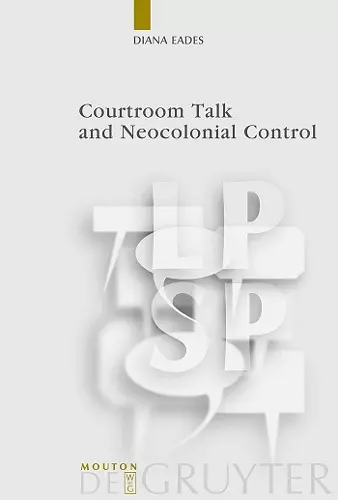Courtroom Talk and Neocolonial Control
Format:Hardback
Publisher:De Gruyter
Published:15th Jul '08
Currently unavailable, and unfortunately no date known when it will be back

The book uses critical sociolinguistic analysis to examine the social consequences of courtroom talk. The focus of the study is the cross-examination of three Australian Aboriginal boys who were prosecution witnesses in the case of six police officers charged with their abduction. The analysis reveals how the language mechanisms allowed by courtroom rules of evidence serve to legitimize neocolonial control over Indigenous people. In the propositions and assertions made in cross-examination, and their adoption by judicial decision-makers, the three boys were constructed not as victims of police abuse, but rather in terms of difference, deviance and delinquency. This identity work addresses fundamental issues concerning what it means to be an Aboriginal young person, as well as constraints about how to perform or live this identity, and the rights to which Aboriginal people can lay claim, while legitimizing police control over their freedom of movement. Understanding this courtroom talk requires analysis of the sociopolitical and historical actions and structures within which the courtroom hearing was embedded. Through this analysis, the interrelatedness of structure, agency, constraint and change, which is central to critical sociolinguistics, becomes apparent. In its investigation of language ideologies that underpin courtroom talk, as well as the details of how language is used, and the social consequences of this talk, the book highlights the need for far-reaching changes to courtroom rules of evidence.
"The story that Eades tells is compelling. By carefully unpacking the speech patterns of boys, the questioning strategies of the defense counsel, and the historical context of the event, she leaves no question whether the boys were victimized by the police or whether the legal system participated in that victimization With its close attention to linguistic, social, and historical detail, this book makes an important contribution to sociolinguistics, sociolegal studies, and critical race studies."Jennifer Andrus in: Language in Society 39/2010 "Courtroom Talk and Neocolonial Control is the mostconceptually sophisticated, comprehensive and compelling attempt to managethe daunting challenge of macro-micro integration in the law and languageliterature - and one that brings this crucial theoretical issue to the forefront ofnot just language and law studies or forensic linguistics but social science moregenerally. This is necessary reading not only for socio- and forensic linguistsbut law and society/social theorists as well."Greg Matoesian in: International Journal of Speech Language and the Law 1/2009 "This is an excellent book."M. Catherine Gruber in: Linguist List 20.2284 "[T]his is a fascinating book that offers important insights into how lawyers use linguistic and discursive strategies to control the testimony of witnesses and into the state of inequality facing Aboriginal people in Australia. [...] [T]his is an important book for all those interested in courtroom discourse, neocolonialism, and the critical analysis of language use." Laura Felton Rosulek in: Journal of Sociolinguistics 16/2 (2012)
ISBN: 9783110204827
Dimensions: unknown
Weight: 705g
407 pages